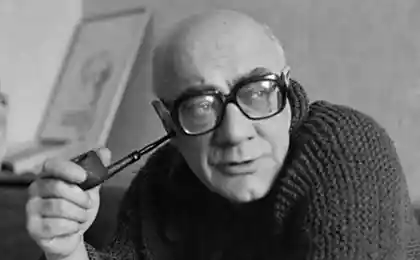482
4 principles on which to build relationships
The basis of all principles, which are listed below, lies the main idea: it is impossible to achieve a higher level of relationship than the level of relationship with himself.
1. What we don't know about ourselves (the unconscious project), or do not see in ourselves (the Shadow), will be projected onto the Other.
2. We project onto the Other their own childhood traumas (individual pathology), our infantile longing (the narcissistic program "return home"), and their need for individuation.
3. Because the Other can not, and should not be held responsible for our injuries, our narcissism and our individuation, projection causes resentment and exacerbates the problem of power.
4. The only way to heal a faltering relationship is to realize our commitment to "go home" and take responsibility for their individuation.

Let's take a closer look to each of these principles:
1) what we don't know about yourself will be projected on the Other
We cannot know what we are unconscious. Jung even said that all our psychological theories are a form of confession, which contains our personal stuff. Relationships are always slowed down, deteriorate, and come to a standstill under the influence of a phenomenon that therapists call "transference" and which is due to the similarity of our mental functions. In other words, the psyche is historical reality. Within us contains our entire personal history.
The present is always "read" through the prism of this story. In fact, the human mind always asks the question: "Where and when this has happened to me before? What is the past feeling like what I feel now? What possible analogy?" Thus, it appears that it is very difficult just to see what is happening at the moment, for this moment is always seen through the prism of the individual stories.
It is obvious that the experience of proximity will intensify the person's previous experiences of a close Other, in particular primary relationship with their parents. Thus, there will always be vulnerability, the constant need for care and attention, behavioral strategies the first involuntary ways of rapprochement and it will always interfere with the formation of relationships in the present.
In fact, even the image of the beloved Other parent strongly distorted complexes. This does not mean that in your love we are looking for a mother or father; it means that in accession to the close relationship we have resumed the same feeling the First Other that is played in scenarios taken from our individual history.
Awareness of unconscious content, mastery of emotionally charged material is extremely difficult. We are aware of the contents of the unconscious, exploring their behavioral styles — not only those that we use now, but those that have existed throughout our history of relations with others. We need to figure out when and why we were too excited, that is, to understand when the complexes are the most common. When our emotional reactions become too strong and are accompanied by a set of rational explanations, we can be sure that here involved complexes.
To join with someone in a close relationship, almost to ask him (or her) to join hands, but only after we are together with this person passed through the minefield, which was mined. Just accusations of his partner that he stepped on a mine laid by the other partner comes to therapy, the vast majority of couples. In addition, this partner is the man who very well knows us, maybe even better than we know ourselves (at least our shadow quality). Although it is degrading and unsafe to listen to the candid comments of Another,- and we have every right not to trust such information — after all, it is difficult to overestimate the contribution that our partner contributes to our self-knowledge.
2) We project onto the Other their own childhood traumas and the need for individuation
None of us are free from this pathology, because nobody escapes from childhood injuries. As already noted, the word pathos is derived from the Greek word meaning "suffering." The term "psychopathology" can be literally translated as "the expression of mental suffering." It's not so much that, injured or not, and if Yes, deep or not; more importantly, how he managed to adapt to life.
The organization of human mental activity includes a range of perception of I and Other and a set of reflexive strategies that govern the energy of interaction between these objects. The main motive of such strategies is the desire to cope with anxiety, which in the context of relationships with others may be the result of existential problems. They may create Another, violating our boundaries or leaving us.
Thus, our relationships suffer is not the result of the inevitable traumas of life, but because of those strategies and scenarios that have formed in the course of our individual history and which we project on the Other. To the extent that we want to love Another and in turn, want to love us, we bring to it its history.
And how can we do this?
For personal development, you need to meet two conditions.
First, we take responsibility for our journey. Regardless of the emotional trauma generated by our individual history, we should now and later be responsible for his choice.
Second, we need to learn, i.e. to learn to see that our life is determined by the sequence of the elections, the psychodynamics of which comes at us from the inside. We need to listen to their psychological reflexes, asking themselves "How did I get this is taken? What episode in my life history it has a direct relationship? What feeling it reminds me of? What are the hidden sources continuously reproduce the same model my behavior?"
These questions are necessary for personal growth; on the other hand, they are not too often to ask even those people who voluntarily come in for psychotherapy. These questions are not too popular in our materialistic, extravertive culture.
Jung noted that "neurotic suffering is an unconscious deception, which does not contain such moral virtues as the true suffering." In another place he writes that "ultimately, the neurosis should be considered as suffering is not self-realized soul". If that is so, we need to take responsibility for their suffering when they happen, and try to look for their meaning. Each of us from time to time wants to get rid of this moral vanity, shifting it to the Other. In doing so, we behave like normal people, but inflict serious damage to our relations with others. To take responsibility for themselves is the worst side of our journey and the greatest gift we can bring to Another.
3) Projection causes rejection and actualizes the problem of power
Although the main fantasy of the longing inherent in modern society is the search for the Good Magician for relief of our individuation, none was given to find him. And even if we could find someone who could ease our burden, we would be firmly tied to a very regressive relationships, which are characterized by strict rules, the infantilism and the lack of development. We all know such relationships that do not give us any optimism.
Both partners inherent in "an identification with the trauma," that is, they are not only scarred emotionally, as any of us, but psychologically dependent on their injuries and confined to the mythology of your pathological splitting. When one partner feels the extreme need of the other and the other feels the need to be needed, is formed codependency — a condition in which each of the partners are emotionally restricted, stopped in their individual development and experiences psychologically naive fantasy that each of them will take care of the Other. Welcome to the "island of neurotic happiness." — so called this as one of Jung's patients.
Let us fantasize further about finding Another who wants to decide for us our task of individuation. The time will come when the Other will Mature to the point that going to resent what is happening, even if he (or she) in his time voluntarily and tacitly agreed to it. This disturbance will penetrate into the relationship and will ruin it. No one is stronger wrath than the man who "does everything right" and secretly wishing for something else.
No one is a stronger frustration than the person who washes clothes of her partner at their own expense. Often when we direct our parent projection onto partner and see that he can throw off this burden, we experience confusion, anger, and part with their illusions. "Why don't you do that I feel good. — we ask, usually unconsciously, sometimes openly and frankly.- Why don't you satisfy my needs?" But in front of us sits Another which causes us frustration and a feeling of hostility, and not the Other, which we expected.
In the beginning, we liked the diversity we another. But now it disturbs us. He (she) must change! How easy to feel that you were betrayed, you count hurt, and to apply all his power.
Leave the ship? No, it is impossible in principle: it is necessary to think about the children. And tactically using or addiction, or anger, or control combined with emotional and sexual alienation, we are trying to put the Other to return to the initial state of the imaginary merge with us. The application of this strategy usually indicates the onset of the second stage, which begins to show the true difference from the us Other, and the projection, which initially contributed to the formation of relations, gradually begin to disintegrate.
This process rarely leaves the possibility for personal development or in order to find out who really is Another, if it is not the hook on which we think we are. Quite the contrary, now we are offended by his former beloved because he in spite of us ceased to be loved. We pay him the same coin, using power.
In itself power is neutral; it is only an energy exchange between people. But because our state is vulnerable, the problem of power occurs everywhere.
Perhaps the most disastrous feature of the government is forcing Another to take part of our responsibilities.
4) the Only way to heal a faltering relationship is to take responsibility for their individuation
What a disappointment and how unromantic — if Another exists on this earth not for me, not for caring about me and not to protect me from my life! What a profound disappointment — it has the same great importance as the loss of contact with heaven, which we call the birth or our first a slight shudder at the feeling of the truth of his mortality. Yes, it appears that we are mortal. And alone we go on the road to death.
The adoption journey is the acceptance by man of his fear and his rejection of his major fantasies.
The rejection of the expectations of salvation of Others is one of the main problems in our lives, so the main aspect of long-term therapy — a gradual adoption of human responsibility for yourself. published
D. Hollis "the dreams of Eden. In search of a good "magician"
P. S. And remember, just changing your mind — together we change the world! ©
Source: /users/10
1. What we don't know about ourselves (the unconscious project), or do not see in ourselves (the Shadow), will be projected onto the Other.
2. We project onto the Other their own childhood traumas (individual pathology), our infantile longing (the narcissistic program "return home"), and their need for individuation.
3. Because the Other can not, and should not be held responsible for our injuries, our narcissism and our individuation, projection causes resentment and exacerbates the problem of power.
4. The only way to heal a faltering relationship is to realize our commitment to "go home" and take responsibility for their individuation.

Let's take a closer look to each of these principles:
1) what we don't know about yourself will be projected on the Other
We cannot know what we are unconscious. Jung even said that all our psychological theories are a form of confession, which contains our personal stuff. Relationships are always slowed down, deteriorate, and come to a standstill under the influence of a phenomenon that therapists call "transference" and which is due to the similarity of our mental functions. In other words, the psyche is historical reality. Within us contains our entire personal history.
The present is always "read" through the prism of this story. In fact, the human mind always asks the question: "Where and when this has happened to me before? What is the past feeling like what I feel now? What possible analogy?" Thus, it appears that it is very difficult just to see what is happening at the moment, for this moment is always seen through the prism of the individual stories.
It is obvious that the experience of proximity will intensify the person's previous experiences of a close Other, in particular primary relationship with their parents. Thus, there will always be vulnerability, the constant need for care and attention, behavioral strategies the first involuntary ways of rapprochement and it will always interfere with the formation of relationships in the present.
In fact, even the image of the beloved Other parent strongly distorted complexes. This does not mean that in your love we are looking for a mother or father; it means that in accession to the close relationship we have resumed the same feeling the First Other that is played in scenarios taken from our individual history.
Awareness of unconscious content, mastery of emotionally charged material is extremely difficult. We are aware of the contents of the unconscious, exploring their behavioral styles — not only those that we use now, but those that have existed throughout our history of relations with others. We need to figure out when and why we were too excited, that is, to understand when the complexes are the most common. When our emotional reactions become too strong and are accompanied by a set of rational explanations, we can be sure that here involved complexes.
To join with someone in a close relationship, almost to ask him (or her) to join hands, but only after we are together with this person passed through the minefield, which was mined. Just accusations of his partner that he stepped on a mine laid by the other partner comes to therapy, the vast majority of couples. In addition, this partner is the man who very well knows us, maybe even better than we know ourselves (at least our shadow quality). Although it is degrading and unsafe to listen to the candid comments of Another,- and we have every right not to trust such information — after all, it is difficult to overestimate the contribution that our partner contributes to our self-knowledge.
2) We project onto the Other their own childhood traumas and the need for individuation
None of us are free from this pathology, because nobody escapes from childhood injuries. As already noted, the word pathos is derived from the Greek word meaning "suffering." The term "psychopathology" can be literally translated as "the expression of mental suffering." It's not so much that, injured or not, and if Yes, deep or not; more importantly, how he managed to adapt to life.
The organization of human mental activity includes a range of perception of I and Other and a set of reflexive strategies that govern the energy of interaction between these objects. The main motive of such strategies is the desire to cope with anxiety, which in the context of relationships with others may be the result of existential problems. They may create Another, violating our boundaries or leaving us.
Thus, our relationships suffer is not the result of the inevitable traumas of life, but because of those strategies and scenarios that have formed in the course of our individual history and which we project on the Other. To the extent that we want to love Another and in turn, want to love us, we bring to it its history.
And how can we do this?
For personal development, you need to meet two conditions.
First, we take responsibility for our journey. Regardless of the emotional trauma generated by our individual history, we should now and later be responsible for his choice.
Second, we need to learn, i.e. to learn to see that our life is determined by the sequence of the elections, the psychodynamics of which comes at us from the inside. We need to listen to their psychological reflexes, asking themselves "How did I get this is taken? What episode in my life history it has a direct relationship? What feeling it reminds me of? What are the hidden sources continuously reproduce the same model my behavior?"
These questions are necessary for personal growth; on the other hand, they are not too often to ask even those people who voluntarily come in for psychotherapy. These questions are not too popular in our materialistic, extravertive culture.
Jung noted that "neurotic suffering is an unconscious deception, which does not contain such moral virtues as the true suffering." In another place he writes that "ultimately, the neurosis should be considered as suffering is not self-realized soul". If that is so, we need to take responsibility for their suffering when they happen, and try to look for their meaning. Each of us from time to time wants to get rid of this moral vanity, shifting it to the Other. In doing so, we behave like normal people, but inflict serious damage to our relations with others. To take responsibility for themselves is the worst side of our journey and the greatest gift we can bring to Another.
3) Projection causes rejection and actualizes the problem of power
Although the main fantasy of the longing inherent in modern society is the search for the Good Magician for relief of our individuation, none was given to find him. And even if we could find someone who could ease our burden, we would be firmly tied to a very regressive relationships, which are characterized by strict rules, the infantilism and the lack of development. We all know such relationships that do not give us any optimism.
Both partners inherent in "an identification with the trauma," that is, they are not only scarred emotionally, as any of us, but psychologically dependent on their injuries and confined to the mythology of your pathological splitting. When one partner feels the extreme need of the other and the other feels the need to be needed, is formed codependency — a condition in which each of the partners are emotionally restricted, stopped in their individual development and experiences psychologically naive fantasy that each of them will take care of the Other. Welcome to the "island of neurotic happiness." — so called this as one of Jung's patients.
Let us fantasize further about finding Another who wants to decide for us our task of individuation. The time will come when the Other will Mature to the point that going to resent what is happening, even if he (or she) in his time voluntarily and tacitly agreed to it. This disturbance will penetrate into the relationship and will ruin it. No one is stronger wrath than the man who "does everything right" and secretly wishing for something else.
No one is a stronger frustration than the person who washes clothes of her partner at their own expense. Often when we direct our parent projection onto partner and see that he can throw off this burden, we experience confusion, anger, and part with their illusions. "Why don't you do that I feel good. — we ask, usually unconsciously, sometimes openly and frankly.- Why don't you satisfy my needs?" But in front of us sits Another which causes us frustration and a feeling of hostility, and not the Other, which we expected.
In the beginning, we liked the diversity we another. But now it disturbs us. He (she) must change! How easy to feel that you were betrayed, you count hurt, and to apply all his power.
Leave the ship? No, it is impossible in principle: it is necessary to think about the children. And tactically using or addiction, or anger, or control combined with emotional and sexual alienation, we are trying to put the Other to return to the initial state of the imaginary merge with us. The application of this strategy usually indicates the onset of the second stage, which begins to show the true difference from the us Other, and the projection, which initially contributed to the formation of relations, gradually begin to disintegrate.
This process rarely leaves the possibility for personal development or in order to find out who really is Another, if it is not the hook on which we think we are. Quite the contrary, now we are offended by his former beloved because he in spite of us ceased to be loved. We pay him the same coin, using power.
In itself power is neutral; it is only an energy exchange between people. But because our state is vulnerable, the problem of power occurs everywhere.
Perhaps the most disastrous feature of the government is forcing Another to take part of our responsibilities.
4) the Only way to heal a faltering relationship is to take responsibility for their individuation
What a disappointment and how unromantic — if Another exists on this earth not for me, not for caring about me and not to protect me from my life! What a profound disappointment — it has the same great importance as the loss of contact with heaven, which we call the birth or our first a slight shudder at the feeling of the truth of his mortality. Yes, it appears that we are mortal. And alone we go on the road to death.
The adoption journey is the acceptance by man of his fear and his rejection of his major fantasies.
The rejection of the expectations of salvation of Others is one of the main problems in our lives, so the main aspect of long-term therapy — a gradual adoption of human responsibility for yourself. published
D. Hollis "the dreams of Eden. In search of a good "magician"
P. S. And remember, just changing your mind — together we change the world! ©
Source: /users/10
How to become a lark
Top 10 largest reservoirs in the world, created during construction of hydropower plants























